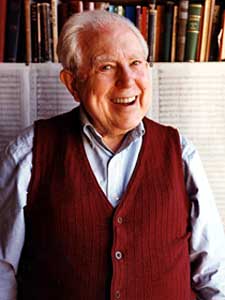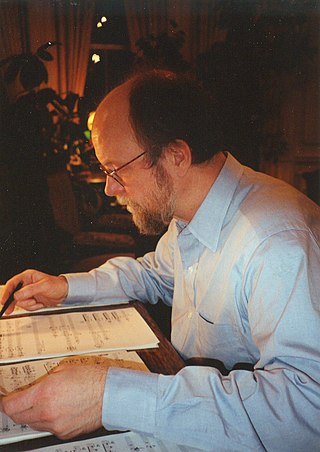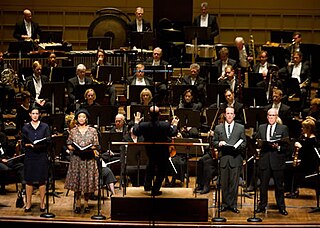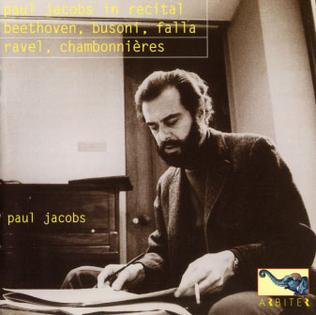Related Research Articles

Elliott Cook Carter Jr. was an American modernist composer. One of the most respected composers of the second half of the 20th century, he combined elements of European modernism and American "ultra-modernism" into a distinctive style with a personal harmonic and rhythmic language, after an early neoclassical phase. His compositions are performed throughout the world, and include orchestral, chamber music, solo instrumental, and vocal works. The recipient of many awards, Carter was twice awarded the Pulitzer Prize for his string quartets; he also wrote the large-scale orchestral triptych Symphonia: sum fluxae pretium spei.

Charles Welles Rosen was an American pianist and writer on music. He is remembered for his career as a concert pianist, for his recordings, and for his many writings, notable among them the book The Classical Style.

Charles Peter Wuorinen was an American composer of contemporary classical music based in New York City. He also performed as a pianist and conductor. Wuorinen composed more than 270 works: orchestral music, chamber music, solo instrumental and vocal works, and operas, such as Brokeback Mountain. His work was termed serialist but he came to disparage that idea as meaningless. Time's Encomium, his only purely electronic piece, received the Pulitzer Prize. Wuorinen taught at several institutions, including Columbia University, Rutgers University and the Manhattan School of Music.

Steven Edward Stucky was a Pulitzer Prize-winning American composer.
Ursula Oppens is an American classical concert pianist and educator. She has received five Grammy Award nominations.

Paul Jacobs was an American pianist. He was best known for his performances of twentieth-century music but also gained wide recognition for his work with early keyboards, performing frequently with Baroque ensembles.
American composer Elliott Carter's String Quartet No. 5 is a composition for string quartet. The work was composed between January and July 1995, as a commission for the Arditti Quartet by the city of Antwerp, by the Wittener Tage für neue Kammermusik, by the Festival d'Automne à Paris, and by Lincoln Center, New York. It was premiered by the Arditti Quartet in Antwerp at deSingel International Art Centre on September 19, 1995.
In Seven Days: Concerto for Piano with Moving Image is a piano concerto by the British composer Thomas Adès. The work was commissioned by the Southbank Centre and the Los Angeles Philharmonic. It was given its world premiere by the pianist Nicolas Hodges and London Sinfonietta under Adès at the Royal Festival Hall on April 28, 2008. An optional video accompaniment was created for performance with the piece by Adès's then partner Tal Rosner.
The Classical Style: An Opera is an American comic opera in seven scenes, with music by Steven Stucky and libretto by Jeremy Denk. The opera was a joint commission from the Aspen Music Festival, Carnegie Hall, the Ojai Music Festival, and Ojai North!, and was premiered under the conductor Robert Spano on June 13, 2014 at the Ojai Music Festival in Ojai, California. The opera is inspired by the musicologist and pianist Charles Rosen's 1971 book The Classical Style and thus follows composers Wolfgang Amadeus Mozart, Joseph Haydn, and Ludwig van Beethoven as they descend from heaven into a modern-day classical music climate. The Classical Style was Stucky's last large-scale composition before his death in 2016.
Nyx is a symphonic poem by the Finnish composer Esa-Pekka Salonen. The work was jointly commissioned by Radio France, the Barbican Centre, the Atlanta Symphony Orchestra, Carnegie Hall, and the Finnish Broadcasting Company. It was premiered February 19, 2011 in the Théâtre du Châtelet, Paris, with Salonen conducting the Orchestre Philharmonique de Radio France. The piece is titled after the Goddess Nyx from Greek mythology.
Dialogues is a composition for solo piano and chamber orchestra by the American composer Elliott Carter. The work was commissioned by the BBC for the pianist Nicolas Hodges and completed in 2003. It was first performed on January 23, 2004 at the Queen Elizabeth Hall in Southbank Centre, London, by Nicolas Hodges and the London Sinfonietta under the conductor Oliver Knussen. The piece was a finalist for the 2005 Pulitzer Prize for Music. In 2012, Carter composed a followup to the piece Dialogues II for the conductor Daniel Barenboim's 70th birthday.
Soundings is an orchestral composition by the American composer Elliott Carter. The work was commissioned by the Chicago Symphony Orchestra for their final season with the conductor Daniel Barenboim as music director. It was first performed on October 6, 2005 at the Symphony Center, Chicago, by Barenboim and the Chicago Symphony Orchestra.
The Concerto for Piano is a composition for solo piano and orchestra by the American composer Elliott Carter. The work was commissioned by the pianist Jacob Lateiner with support from the Ford Foundation. It was composed between 1964 and 1965 and was first performed at Symphony Hall, Boston on January 6, 1967, by Lateiner and the Boston Symphony Orchestra under the conductor Erich Leinsdorf. The piece was dedicated to the composer Igor Stravinsky for his 85th birthday.
Dialogues II is a composition for piano and chamber orchestra by the American composer Elliott Carter. It was composed in celebration of the conductor Daniel Barenboim's 70th birthday. The work was first performed at La Scala, Milan on October 25, 2012, by Barenboim on the piano and the Orchestra of La Scala under the conductor Gustavo Dudamel. Composed at the age of 103, Dialogues II was one of Carter's last completed orchestral compositions before his death in November 2012. The piece is a follow-up to the composer's 2003 Dialogues, which was a finalist for the 2005 Pulitzer Prize for Music.
The Double Concerto for Harpsichord and Piano with Two Chamber Orchestras is a composition by the American composer Elliott Carter. The work was commissioned by the Fromm Music Foundation and is dedicated to the philanthropist Paul Fromm. It was completed in August 1961 and was first performed at the Metropolitan Museum of Art's Grace Rainey Rogers Auditorium on September 6, 1961. The premiere was performed by the harpsichordist Ralph Kirkpatrick and the pianist Charles Rosen under the conductor Gustav Meier.
Interventions is a composition for solo piano and orchestra by the American composer Elliott Carter. The work was composed at the behest of the pianist Daniel Barenboim and the conductor James Levine to celebrate Carter's 100th birthday. The piece was completed on April 16, 2007 and was first performed in Symphony Hall, Boston on December 4, 2008 by Daniel Barenboim and the Boston Symphony Orchestra under James Levine.

Old and Lost Rivers is a short orchestral composition by the American composer Tobias Picker.
Polaris: Voyage for Orchestra is an orchestral composition by the British composer Thomas Adès. The work was co-commissioned by the New World Symphony under the direction of Michael Tilson Thomas for the opening of the New World Center. The New World Symphony was joined in commission by the Royal Concertgebouw Orchestra, the New York Philharmonic, the Calouste Gulbenkian Foundation, the Barbican Centre, the Los Angeles Philharmonic, and the San Francisco Symphony. It was given its world premiere by Michael Tilson Thomas and the New World Symphony at the New World Center in Miami Beach on January 26, 2011.
Two Controversies and a Conversation is a composition for piano, percussion, and chamber orchestra by the American composer Elliott Carter. Its world premiere was given on June 8, 2012 at the Metropolitan Museum of Art in New York City by the pianist Eric Huebner and the percussionist Colin Currie with the New York Philharmonic under the direction of David Robertson. The piece is dedicated to Colin Currie and the pianist Pierre-Laurent Aimard. It was one of the last works composed by Carter, who completed the piece at the age of 103.
Eros Piano is a piano concerto written by the American minimalist composer John Adams. The work was commissioned by the Koussevitzky Music Foundation in 1984 and was completed in 1989. Its world premiere was performed by the pianist Paul Crossley and the London Sinfonietta conducted by Adams on November 24, 1989, in Queen Elizabeth Hall, London. The piece is dedicated to Paul Crossley. It is the first of three piano concertos by Adams, followed by Century Rolls in 1996 and Must the Devil Have All the Good Tunes? in 2019.
References
- 1 2 Carter, Elliott (1980). "Night Fantasies". G. Schirmer Inc. Retrieved May 18, 2016.
- 1 2 3 Swed, Mark (April 10, 2008). "'Fantasies' for the wide-eyed: Ursula Oppens takes an exhilarating turn at Elliott Carter's complex piece". Los Angeles Times . Retrieved May 18, 2016.
- ↑ Kozinn, Allan (November 5, 2012). "Elliott Carter, Composer Who Decisively Snapped Tradition, Dies at 103". The New York Times . Retrieved May 18, 2016.
- ↑ Clements, Andrew (19 February 2009). "Classical review: Elliott Carter, A Nonesuch Retrospective, and others". The Guardian . Retrieved May 18, 2016.
- ↑ Kuderna, Jerry (December 2, 2008). "In the Sound Fields of Elliott Carter". San Francisco Classical Voice. Retrieved May 18, 2016.